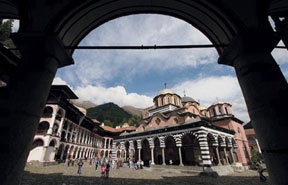|
observer |
|
|
|
|
|
OTHER LINKS |

|

|

|
Many countries on the EU's plateThe European Union is about to take in two new members before it has recovered from the indigestion caused by its biggest-ever enlargement two-and-a-half years ago. *In May 2004, 10 new countries joined the club, eight of them former communist states from Central Europe.
"The indigestion from that biggest-ever enlargement is putting the whole enlargement process at risk," says Hugo Brady of the Centre for European Reform. Some countries are still reeling from the scale of migration from these 10 new members, which no-one predicted. The European Commission estimated there would be a total of 70,000 to 150,000 migrants per year throughout the EU, whereas the UK alone is now thought to have received up to 600,000 over two years. No-one knows how many migrant workers will make the journey west from Bulgaria and Romania, in addition to those who have already come either illegally, or by obtaining work permits. Romania's population is roughly half the size of Poland's, but it is double Hungary's or the Czech Republic's. And it is much poorer - its GDP per head is a third of the EU average, compared with a half in Poland's case. The older EU states have also found a couple of the newer states to be awkward partners at times. Poland startled some EU governments by fighting tooth and nail over its voting rights in the EU's Council of Ministers before it had even joined. More recently, it has argued for the re-introduction of the death penalty - anathema in many European capitals - and raised hackles by bringing into a coalition government a party with a reputation for anti-Semitism and homophobia. Hugo Brady draws parallels with a "difficult period" which followed the accession of a "somewhat belligerent and nationalist" Greece in 1981, not long after it emerged from dictatorship. The period did not last long, he says. EU membership helped to seal the country's full transition to democracy, and it quickly became a valued member of the union. The indigestion problem, however, is more serious at street level than it is in the corridors of power. Some Europeans have come to associate enlargement with a heightened risk of crime, and a source of economic problems from low wages to unemployment. The fact that more than 60% of people in some European countries disapprove of further enlargement would be awkward enough at any time, but is particularly so in the wake of the rejection of the draft EU constitution by French and Dutch voters last year. That big slap in the face from two founder members of the union hugely increased the pressure on the EU to show that it is democratic, delivering policies that voters want, and not a train running out of control. (BBC NEWS) |
 The unprecedented speed of this next expansion, albeit a much smaller
one, partly explains why the reaction in many European capitals is, as
one British columnist has put it: "Oh no, do we have to?" The fact that
officially this is not a new enlargement, but part two of the last one,
makes no difference.
The unprecedented speed of this next expansion, albeit a much smaller
one, partly explains why the reaction in many European capitals is, as
one British columnist has put it: "Oh no, do we have to?" The fact that
officially this is not a new enlargement, but part two of the last one,
makes no difference. 







